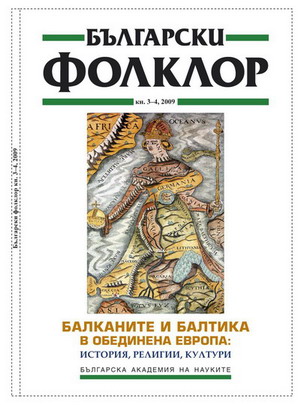Отражение на елементите на националната култура върху латвийските етнически стереотипи в началото на ХХІ век
Elements of National Culture Reflected in the Latvian Ethnic Stereotypes at the Beginning of 21st Century
Author(s): Ilze BoldāneSubject(s): Anthropology
Published by: Институт за етнология и фолклористика с Етнографски музей при БАН
Summary/Abstract: Data of contemporary public polls confirmed that for Latvians ethnical identity is still one of the most important among the great diversity of other social identities. The kinfolks’ notions about themselves as representatives of a definite ethnic group and definite culture bearers with all indications and meanings arising from this claim form their worldview, moral standards and survival strategies and are the precondition for formation of their hetero stereotypes. The result of the author’s research work (fieldwork’s data and studies of written sources) shows that the set of ethnic symbols with which Latvians associate themselves and through which they want to be recognized by others nowadays has changed very little since its construction during the second half of the 19th century. The following elements of self-stereotype have to be emphasized: peasant nation, nation that sings orphan nation (nation that had suffered a lot) and speakers of the Latvian language. The presence of the mentioned elements of nation’s culture in Latvian self- stereotypes still in the 21st century could be determined by several factors. First, till there was a real base to create the definite notion, e. g. till World War II, about 70% of the Latvians were rural people and this is one of the causes for the construction of the symbol peasant nation. The stereotype is formed as a result of the reality in which it later returns to substitute that reality. Second, deliberately maintained reference to specific cultural areas by Latvian elite groups or/and ideologists of political regime (Neo-Latvians, K. Ulmanis a. o.) for their political, economic and other purposes. Thirdly, the definite spreading of these elements through such instruments like educational system (folk songs as an integral part in school books, etc.), legislative acts (State Language Law, Education Law, Song and Dance Celebration Law, Law on Holidays and Remembrance Days etc.), cultural events (Song and Dance Festival etc.), media a. o. with aim to achieve a unifying notion of the nation.
Journal: Български фолклор
- Issue Year: XXXV/2009
- Issue No: 3-4
- Page Range: 100-106
- Page Count: 7
- Language: Bulgarian
- Content File-PDF

